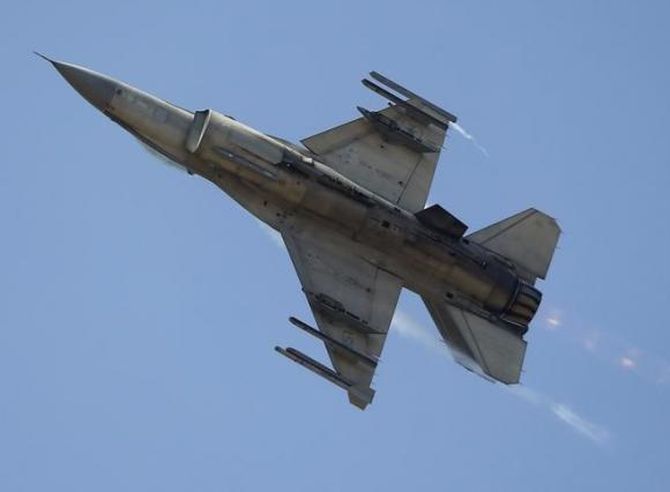Diplomatic and Congressional sources tell Rediff.com that for all intents and purposes, the F-16 sale is dead.
Aziz Haniffa/Rediff.com reports from Washington, DC.

Nisha Desai Biswal, the Obama administration's point person for South Asia, has acknowledged that the administration has heard the United States Congress' concern over the proposed sale of F-16 fighter aircraft to Pakistan loud and clear, and admitted that supply of these planes to Islamabad is in limbo.
Diplomatic and Congressional sources told Rediff.com that after the administration, in a surprising about-face last month -- after being enthusiastic about the sale and shrugging aside India's concerns -- told Pakistan that if Islamababad wanted the planes, it would have to pay for it and United States taxpayers' money would not be approved by Congress to subsidise it, for all intents and purposes, this deal was dead.
Appearing before the House Foreign Affairs Subcommittee on Asia and Pacific to seek Congressional support for the administration's foreign aid request for South Asia for fiscal year 2017, Biswal -- the US Assistant Secretary of State for South Asian Affairs -- said, 'Let me start by saying we have a very important relationship between the United States and India and we also have a very important relationship between the United States and Pakistan.'
'Each relationship stands on its own merits and in furtherance of our goals and interests with both countries, we don't see them in any way as being zero-sum,' she said.
'The F-16 platform is one that we have felt has been used successfully in combating terrorism and that has been the basis on which the administration put forward the notification to provide additional eight F-16s,' Biswal told the subcommittee.
"However," she added, "we understand the very serious concerns that have been raised by Congress and those concerns are right now being taken into consideration. And, so, I don't have an update for you with regard to that notification and where it goes."
"I will say that we have recognised the concerns that Congress has raised with us," Biswal added.
She was responding to questions by subcommittee chairman, Representative Matt Salmon, Arizona Republican, who asked Biswal 'if the sale is in limbo right now' and recalled that at the previous hearing of the full committee 'there was a loud voice' over the proposed sale to which India had objected.
'I do believe that the administration has listened to what Congress said,' Salmon said, and told Biswal, 'I believe you are trying to be responsive and I want to compliment you for that because this was across the aisle.'
'This (concern about the sale),' Salmon pointed out, 'wasn't just Republicans or Democrats -- this was across the aisle. A lot of concern was expressed and to its credit, I believe the administration is taking these things into account and I want to thank you for that'
Last month, in the wake of some powerful US Senators, led by Senate Foreign Relations Committee Chairman Bob Corker, Tennessee Republican, putting a hold on US taxpayers' money being used to subsidise these sales to Pakistan, State Department Spokesman John Kirby had said, 'While Congress has approved the sale, key members have made clear that they object to using foreign military financing to support it.'
'Consequently,' Kirby said, 'Given Congressional objections, we have told the Pakistanis that they should put forward national funds for that purpose.'
On February 11, the State Department had informed Congress about its decision to provide Pakistan with 8 fighter aircraft at an estimated cost of $700 million and all the lobbying against it by the Indian government seemed to have come to naught.
Senior administration officials from Secretary of State John F Kerry downwards argued that it was 'a legacy sale' and Pakistan needed the aircraft to assist in its counter-terrorism efforts.
But Senator Corker put a hold on the sale, arguing that it would not let the Obama administration use taxpayers' money to subsidise these sales, particularly when it was hard to justify when Islamabad was not coming down hard against terrorist organisations operating from its territory, particularly the Haqqani Network, and that safe havens for these groups continued to exist in Pakistan.
'Effective engagement with Pakistan, we believe, is critical to promoting the consolidation of democratic institutions and economic stability in supporting the government's counterterrorism activities and capabilities,' Kirby, expressing the administration's disappointment over the Congressional hold, said.
'As a matter of long-standing principle, the Department of State opposes conditions to the release of appropriated foreign assistance funds,' Kirby complained. 'We believe that such conditions limit the President and the secretary (of state's ability to conduct foreign policy in the best interest of the United States.'
Salmon, at an earlier House Foreign Affairs Subcommittee hearing, asserted that Pakistan 'too often does the bare minimum to keep the money flowing without real change. Pakistan's priorities are seriously misaligned with our own.'
'Many members of Congress, including me, seriously question the judgment and timing of such a sale,' Salmon said. 'Additionally, Indo-Pak tensions remain elevated and some questions whether the F-16s could ultimately be used against India or other regional powers, rather than the terrorists as Pakistan has asserted.'











 © 2025
© 2025